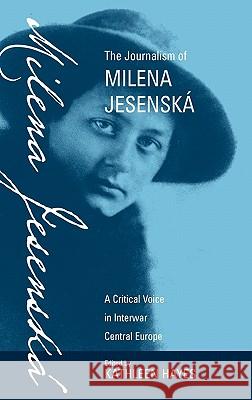The Journalism of Milena Jesenská: A Critical Voice in Interwar Central Europe » książka
The Journalism of Milena Jesenská: A Critical Voice in Interwar Central Europe
ISBN-13: 9781571815606 / Angielski / Twarda / 2003 / 240 str.
Milena Jesenska, born in Prague in 1896, is most famous as one of Franz Kafka's great loves. Although their relationship lasted only a short time, it won the attention of the literary world with the 1952 publication of Kafka's letters to Milena. Her own letters did not survive. Later biographies showed her as a fascinating personality in her own right. In the Czech Republic, she is remembered as one of the most prominent journalists of the interwar period and as a brave one: in 1939 she was arrested for her work in the resistance after the German occupation of Bohemia and Moravia, and died in Ravensbruck concentration camp in 1944. It is estimated that Jesenska wrote well over 1,000 articles but only a handful have been translated into English. In this book her own writings provide a new perspective on her personality, as well as the changes in Central Europe between the two world wars as these were perceived by a woman of letters. The articles in this volume cover a wide range of topics, including her perceptions of Kafka, her understanding of social and cultural changes during this period, the threat of Nazism, and the plight of the Jews in the 1930s.
"Jesenskás essays offer firsthand observations on a society that was slowly imploding between the years 1920 and 1939 [and] will certainly encourage lively classroom debates (especially in womens studies, political science and history courses) concerning politics, the condition of women, and social problems of yesterday and today." · Slavic and East European JournalMilena Jesenská, born in Prague in 1896, is most famous as one of Franz Kafkas great loves. Although their relationship lasted only a short time, it won the attention of the literary world with the 1952 publication of Kafkas letters to Milena. Her own letters did not survive. Later biographies showed her as a fascinating personality in her own right. In the Czech Republic, she is remembered as one of the most prominent journalists of the interwar period and as a brave one: in 1939 she was arrested for her work in the resistance after the German occupation of Bohemia and Moravia, and died in Ravensbrück concentration camp in 1944.It is estimated that Jesenská wrote well over 1,000 articles but only a handful have been translated into English. In this book her own writings provide a new perspective on her personality, as well as the changes in Central Europe between the two world wars as these were perceived by a woman of letters. The articles in this volume cover a wide range of topics, including her perceptions of Kafka, her understanding of social and cultural changes during this period, the threat of Nazism, and the plight of the Jews in the 1930s.Kathleen Hayes received her Ph.D from the School of Slavonic and East European Studies, University of London, and has taught Czech literature and history at Charles University and New York University in Prague.











